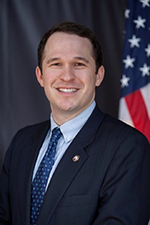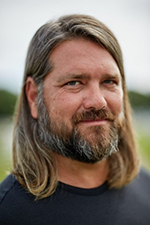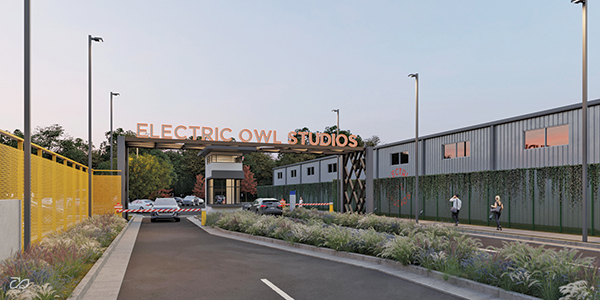On a spring day in Georgia colder than it should have been, a new film studio officially broke ground last week in an Atlanta neighborhood that welcomes the warm sunshine of new investment. Electric Owl Studios — the sixth film and TV production studio in metro Atlanta’s DeKalb County — aims to be nothing less than the greenest studio in the world, and the first purpose-built studio to seek LEED-Gold certification. Set to open in early 2023, the 300,000-sq.-ft. complex will include six stages.
The process unfolded in more stages than that, over the six years since Electric Owl co-founder Dan Rosenfelt moved his family from the land of sun and movies itself — Southern California.
“We’d never been here a day in our lives,” said Rosenfelt at the ceremony, crediting his co-founder Michael Hahn — developer of Third Rail Studios at the former GM plant site in Doraville, where Rosenfelt was president — as the individual who “plucked me from obscurity in Los Angeles. My life changed moving here.”
Electric Owl hopes to change plenty of lives, starting in its immediate south DeKalb neighborhood where under-investment has been the calling card.
“I’ve seen the positive impact on the community a film studio can have,” said Hahn, “not just as a catalyst for jobs. It is an industry that promotes diversity and inclusion, and a positive force for education for young people, and we take that responsibility very seriously.”
A total of 366 film and TV productions spent $4 billion in Georgia in 2021, a new record for the state.
In an earlier conversation, Hahn told me, “We are not a tucked-away thing on a hill. Our productions need privacy and security, but as far as being a studio in a neighborhood, town and city, we want to be as connected as can be. We are sending ripples out that are creating change locally.”
“This is happening in south DeKalb, Georgia,” DeKalb County CEO Michael Thurmond told the audience on Redan Road last week, which responded with a standing ovation. He said projects like Electric Owl come about because of public-private partnership and leadership. “Being CEO is OK, but it really sucks if you don’t have four votes on the commission,” he said. “I’m so proud that, working with these commissioners, municipal partners and with Decide DeKalb, we are at a point in time when the dream is becoming reality.”

Electric Owl’s team found a rare large parcel of land inside Atlanta’s perimeter highway for its new 18-acre development, purchasing it from a family who had been on the site for more than 100 years.
Fish Out of Water? Not Exactly
Among the steps making that dream come true were zoning changes and property assembly. Hahn says he’d been looking in the area since 2019, as large tracts of land within Atlanta’s perimeter highway I-285 were becoming more and more challenging to find. The parcel, which at one time had a short airplane strip before I-285 existed, is directly adjacent not only to the highway, but, like Third Rail in Doraville, also adjacent to a a MARTA rail transit terminus, in this case the Indian Creek station on the system’s east-west line. The property was purchased from a family who had been on the site for more than 100 years. Domain Capital Group’s Domain Capital Advisors subsidiary and developer Capstone South Properties closed on the property in December. Completion is expected by next January. “We feel like bringing this $60 million project to the neighborhood will be a great economic generator,” Hahn says. “At this point, it is a legacy neighborhood where there hasn’t been a whole lot of new commercial activity for 30 years or so.”
An earlier but no less consequential stage in the process was a big shift in environment and time zones for Electric Owl principal Rosenfelt, whose move six years ago was life-changing for his family, including his wife Jen, an early childhood development instructor who has made her own contribution to the region via teaching positions at Georgia State University and Gwinnett Technical College.
“I really appreciated the connectivity people in this industry have in Georgia. It’s not necessarily the same in Los Angeles,” Rosenfelt says. “People are connected in a way I really did not find before. That was a really pleasant surprise for me. I immediately joined a lot of boards of directors and advisory boards, and I was almost shocked at how positive and connected everyone was in this industry. That was one thing that was a great culture shock for me.”

Matt Dollar, Deputy Commissioner of Economic Development, Technical College System of Georgia
Matt Dollar, a longtime state legislator, recently left the General Assembly and his role as chairman of the House Creative Arts and Entertainment committee to accept the title of the Technical College System of Georgia’s deputy commissioner of economic development. I asked him whether the “pleasant surprise” response from a transplanted L.A. entertainment leader like Rosenfelt was starting to become a familiar refrain among industry executives.
“This does not surprise me at all,” he says. “Many I have spoken with were happy to be leaving. Policy decisions and state management have made us one of the top places in the country for growth and opportunity — film being just one of these many, many industries. On top of being a great place in its own right, Georgia does not face nearly the same manufactured challenges that California has.”
Sometimes it’s a manufactured perception.
“I love Los Angeles and loved living there for 15 years,” says Rosenfelt, a native Philadelphian. But in L.A., “if you move away, they think you left the industry. They think you disappeared.”
Even in a busy hub like Georgia, he says, the view from afar for a long time was that it was more a means to an end for L.A. folks. The incentives meant “we have to go there to save money,” he says, but there would not be a savvy workforce to greet them when they did. All that’s changed.
“We’ve gotten more educated crew, people from all parts of the world,” Rosenfelt says. “We have incredible brand-new stages here, all the vendors they need, all the ancillary things they require to make their shows, and an education system with the Georgia Film Academy that is creating new crew members who can stay and live here and not move away, and see it mature in Georgia. In the history of film and TV, every time it’s moved from its hub, everyone poo-poohed it, from the beginning with Edison in New York and moving to L.A. People said, ‘You’re crazy, no one does anything there, you guys are going to fail.’ So we see how that turned out.
“I think over time, it’s a unique story in Georgia,” he says, “because other states have had tax incentives that ebbed and flowed, changed their scope and didn’t become as fortified and robust as Georgia has. They’ve built more and faster than L.A. has. We have agencies, management companies, big-time actors buying homes here. That’s an exciting thing as well.”
Then he says the words that every economic developer who says “If we can just get you here,” dreams of: “It’s been a great surprise for me. I didn’t know. I hadn’t been to the entire region before.”
Beth Moore, an entertainment attorney and senior counsel with Vivid IP finishing out her term as a state representative in the Georgia Assembly and launching a campaign for state senator, says people in the industry who come from California and other places like the favorable cost of living, the diversity of the population and the fact they can enjoy living in a country idyll not far from Atlanta’s metropolis of 6 million. Some of them come despite political misgivings.
“A comment I received from a high-ranking film executive was that in California he considers himself a Republican, but in Georgia he considers himself a Democrat,” she says. “They like Georgia’s favorable business climate, but are not too keen on some of the social policies. I don’t know if it’s getting better or worse — it depends on the day — but they’re committed to staying in Georgia and keeping at bay some of the more extreme policies we see in the legislature.”
Foundations, Academies and Policies Set the Stage
After the shovels were put away at the Electric Owl groundbreaking, DeKalb CEO Thurmond, a former interim superintendent of the DeKalb County School District, told me that the goal is not just creating career pathways for area residents, but contracting opportunities as well. “The real opportunities are in the jobs that support the industry,” he said. “It’s exciting to film ‘Jumanji’ here, but we don’t want the opportunity to end when the production ends.”
Multiple organizations are filling the lanes to sustain the long-term needs of an industry that by its nature is known for its short-term impacts — film and TV production is the ultimate “gig economy,” as talent at every level moves from one project to the next. It’s the jurisdiction’s job to keep that movement in stride.

Ryan Millsap, CEO of Blackhall Americana and founder of Blackhall Studios in Georgia, ponied up half a million dollars to start the new Georgia Film Foundation.
Photo courtesy of GFF
Decide DeKalb Chair Don Bollia credited the journey undertaken by the State of Georgia years ago in setting up the state film commission and establishing incentives for the industry. “All of those things don’t happen overnight,” he said, saluting audience member Blackhall Studios Chairman and CEO Ryan Millsap among the investors in the community. The week prior, Millsap and Executive Director Delores Crowell had launched the non-profit Georgia Film Foundation (GFF) as a vehicle to raise funds to grow film and television programs at high schools, colleges and universities in the state.
“The state of Georgia has done a stellar job providing government-funded programs to benefit communities and grow a strong entertainment-based labor force,” Crowell said in the GFF’s press release. “It is time for the private sector to step up and support the growth in a focused way.”
The idea is similar to what’s unfolding in the tech world, as giants such as Google, Microsoft and Amazon step forward with initiatives and big checks to support workforce development, education, housing and other needs in the communities in which they invest.
“There are some exemplary programs in Georgia right now,” said Millsap, who contributed $500,000 to launch the GFF. “What we want to do, in the private sector, is simple — we want to use corporate dollars to support them. Our part to is to assist in growing what has become one of the most significant financial contributors to the state’s economy. Our hope is that Disney, Sony, Warner Brothers, Netflix, Paramount, HBO, Universal, Amazon and Apple will see what is happening in Georgia and will join us in contributing capital to the advancement of young people across the state.”

“Working with both entertainment and Fortune 500 leaders in the state who can only gain from growing a skilled and savvy labor force is our number one priority.” — Delores Crowell, Executive Director, Georgia Film Foundation, March 15, 2022
Photo courtesy of GFF
Nice Gig If You Can Get It
The GFF aims to be a private-sector complement to the work of the Georgia Film Academy (GFA), which is backed by the University System of Georgia and the Technical College System of Georgia (TCSG). The GFA says its students have trained directly on more than 100 major feature film and TV productions in the state, including “Antman,” “Walking Dead,” “Ozark” and “Spiderman.” The Academy says industry growth is projected to generate 40,000 jobs in Georgia over the next 18 months with a $2 billion investment and an average production job salary of $84,000.
“The Georgia Film Academy was a first-of-its-kind program,” Dollar says. “Instead of starting from scratch, we created a new program using the existing infrastructure at TCSG and USG. The result has been wildly successful, and the model that other states are trying to replicate. I expect even greater developments from GFA, under the leadership of Jeffery Stepakoff. Together with [TCSG] Commissioner [Greg] Dozier and [USG] Chancellor [Sonny] Perdue, I expect us to work together toward impacting other lucrative sectors of the industry. Georgia is now a world leader in film production, and I’d like to see its next step as a leader in content creation.”

Entertainment attorney and two-term Georgia state representative Beth Moore (now running for office in a newly redrawn state senate district) says film and TV production industry talent knew how to work in a gig economy way before the rest of us.
Photo by Mark Hill Photography, copyright 2021
Beth Moore observes the the GFA has done a great job of transferring the education work often conducted in a brick-and-mortar environment to a more mobile model that can even be deployed on set. It gives Georgia residents and students a leg up, she says. “We still very much want people with talent to move here but also want to develop talent right here at home.”
Asked how people’s perceptions of entertainment economy jobs may have evolved from viewing them as gig-oriented and temporary to something steady and highly remunerated, Dollars says, “Tens of thousands of Georgians have figured it out first-hand already. The hundreds of businesses that work to serve the industry have figured it out as well. Word is getting out about the opportunity provided by the Georgia Film Academy, providing, in a short time and in every corner of the state, world class training for not just a job, but a career in which you are in high demand.”
Responding to the same question, Beth Moore says everyone in the industry understands that gigs are how things work: “Somebody can work on a Marvel film for six months and go on to another job,” she says. “I’m a millennial, so I’ve worked in the gig economy for pretty much my entire life.”
In fact, understanding the realities of the gig economy, which today stretches into many industry sectors, is central to her campaign platform where health care coverage is concerned. Even a fellow legislator, a mortician, was able to get in on the act, she says, by renting out his hearse to a film production. At the same time, she says, “the Georgia Film Academy was promoting the fact they are able to place their graduates in jobs that are in some cases six-figure salaries.”
Business Environment, Actual Environment
The decision by Electric Owl to pursue LEED-Gold certification was not made lightly. But like a good actor’s choices, it was made with clear intentions.
“As we started to look around at studios around he world, we realized there was a gap in two things,” says Dan Rosenfelt: a model for sustainability and a studio brand able to be replicated in different locations.
“Many think there is some barrier to entry and they will have to charge clients too much,” he says of the sustainability mission. “But we were able to figure out a way to infuse this new studio with all these new elements. A lot of people in the film industry don’t know what LEED is, but we’re going to educate them about that.”
Meanwhile, those who do know what LEED is are some very big names indeed.

"It’s exciting to film ‘Jumanji’ here," says DeKalb County CEO Michael Thurmond, "but we don’t want the opportunity to end when the production ends."
“Netflix is one of the leaders in renting real estate around the world for production,” Michael Hahn tells me, and last year announced a policy calling for reducing carbon emissions and achieving net-zero emissions by the end of this year. Electric Owl’s environmental proposition dovetails well with that goal, as well as with the goals of growing sustainability departments at NBC Universal and other giants. “We feel like we’re poised to capture a lot of that from Netflix and all production companies,” Hahn says.
As for the replicable brand, “No studio has created an image for itself and replicated it around the world so people know what they are going to get in each city they might be filming in,” says Rosenfelt, whose resume includes work with The Jim Henson Company and George Clooney’s Smokehouse Pictures at Warner Brothers. “Prior to the new content wars with all these streaming services and deals, there wasn’t enough production in every city or major film hub to justify building your own studio there and ensuring there would productions to fill it. They were all kind of one-offs. We think it will work because there is not enough studio space in the world for all the productions. Vancouver, Toronto, L.A., Atlanta, London, New York/New Jersey — if we’re creating a new, unique model with our sustainability, almost with this boutique hotel feel — not a grand sprawling studio, but something a bit more concise yet well-amenitied and well considered on all facets — we could replicate that everywhere.”
The benefits accrue to the studio’s neighborhood in multiple ways. For example, high-speed fiber being brought in to support new virtual reality screen technology on campus means the south DeKalb neighborhood Electric Owl occupies will be seeing high-speed fiber a bit earlier than it otherwise might have.
As any boutique hotel customer knows, it’s the service that makes the difference. In that respect, Electric Owl hopes to replicate for its movie-making clientele the welcome that DeKalb County and Georgia have offered the studio.
“ ‘Trustworthy’ is part of our brand,” says Hahn. “This is a word-of-mouth business, and reputation is so important.”
“We have a good sense of what producers and production executives need. That separates us as well,” Rosenfelt says. “The ability to be present and thoughtful, understanding their language, the ability to effectively communicate with them. There is something to having that clearinghouse, that one person who is a true partner for production. ‘Do you have space? Can we accomplish this?’ My default answer is ‘Yes,’ and they’re not always used to that. That will be part of our secret sauce as well. I’m an easy yes. ‘Yes’ in almost everything in the world is the best answer, but particularly in film production where they don’t have time to get into the minutiae. They have 10,000 things to accomplish that day. It keeps them coming back too.”
Just like the entertainment production keeps coming back to Georgia and, with increasing frequency, to DeKalb County.
“Our mission is to provide for and enhance the quality of life for citizens of this county,” Decide DeKalb President Dorian Barr, who grew up a stone’s throw away from the studio site, said at the groundbreaking. “Every business we meet with, we ask, ‘Does this improve the quality of life for DeKalb County?’ And this project does.”

